News

People from outstation areas begin arriving for the Nugegoda rally
The first public rally organized jointly by several opposition groups against the government—based on 21 key issues—is scheduled to be held today (Nov. 21) in Nugegoda.
The rally, titled “The Great Voice of the People Against the Deceptive Malima Government’s Foolish Rule,” is being organized by the Sri Lanka Podujana Peramuna (SLPP) and is set to begin at 2 p.m. at the Ananda Samarakoon Open Air Theatre in Nugegoda.
According to the organizers, the protest is being held on the basis of 21 grievances, including:
- The suspicious release of shipping containers
- The failure to reduce fuel prices as promised
- The failure to reduce electricity tariffs by one-third
- Protecting the “rice mafia”
- Increasing the tax burden
- Undermining the nation's dignity
- Favoritism toward political allies
- Corruption involving ministers’ and MPs’ assets
- Failure to provide jobs for graduates and qualified youth
- Pushing farmers into hardship
- Escalating cost of living
- Undermining the rule of law
- Spreading hatred
- Politicizing everything
- Destroying local culture
- Disregarding war heroes
- Forming friendships with separatist groups
- Entering into fraudulent agreements
- Being exposed for making false statements
- Failing to serve the country
- Having no future plan for the nation
- The SLPP states that the rally’s purpose is to pressure the government to fulfill its promises.
SLPP General Secretary, Attorney-at-Law Sagara Kariyawasam, said that the rally is being held to push the government to honor the commitments it made to the people.
Commenting on the event, MP Namal Rajapaksa said:
“A strong public opinion is rising in the country—that this government has become one that lies endlessly, cannot work, and is incapable of delivering results. The opposition has a responsibility to awaken the government and remind it of its obligations. We are fulfilling that responsibility.”
Provincial correspondents report that large numbers of buses from regions such as Kandy, Anuradhapura, and Badulla departed early this morning to attend the rally.
Organizers say that around 270 buses from various areas have already left for Nugegoda. Former Minister Lakshman Yapa Abeywardena stated that many buses are also expected from Galle, Matara, Hambantota, and Kalutara districts. He added that buses using the expressway will be departing after 11 a.m. today.
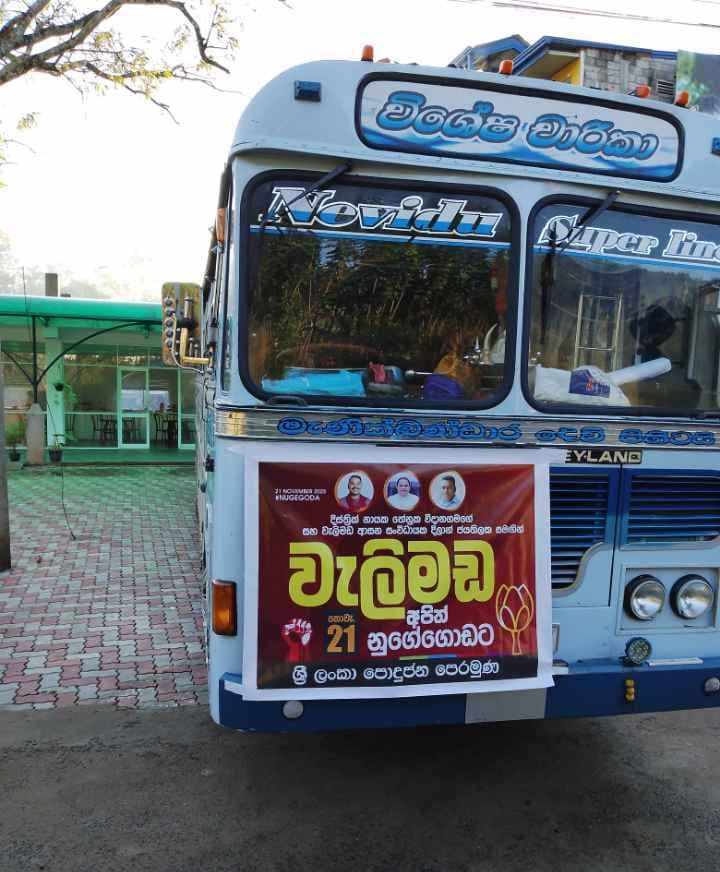

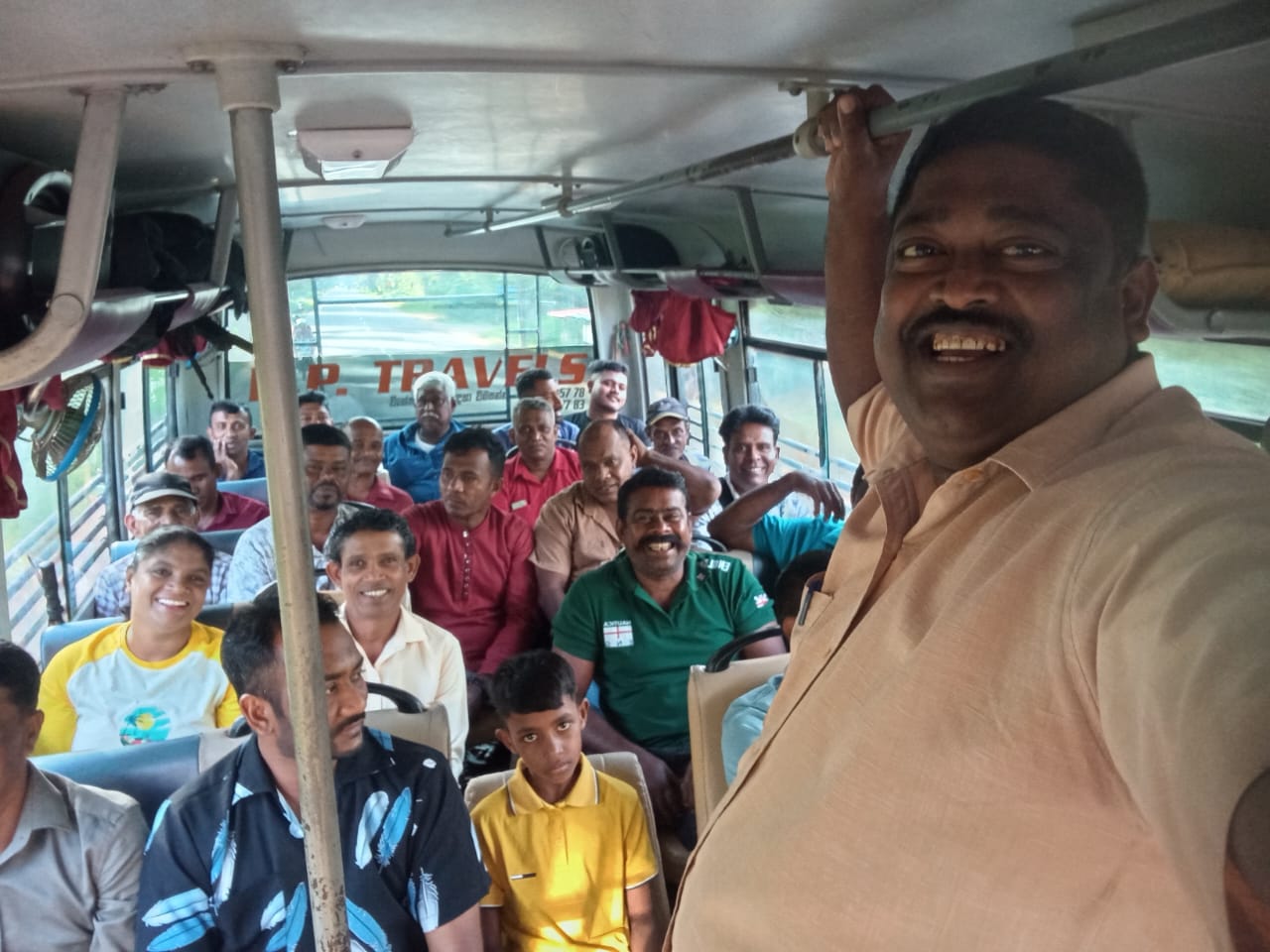
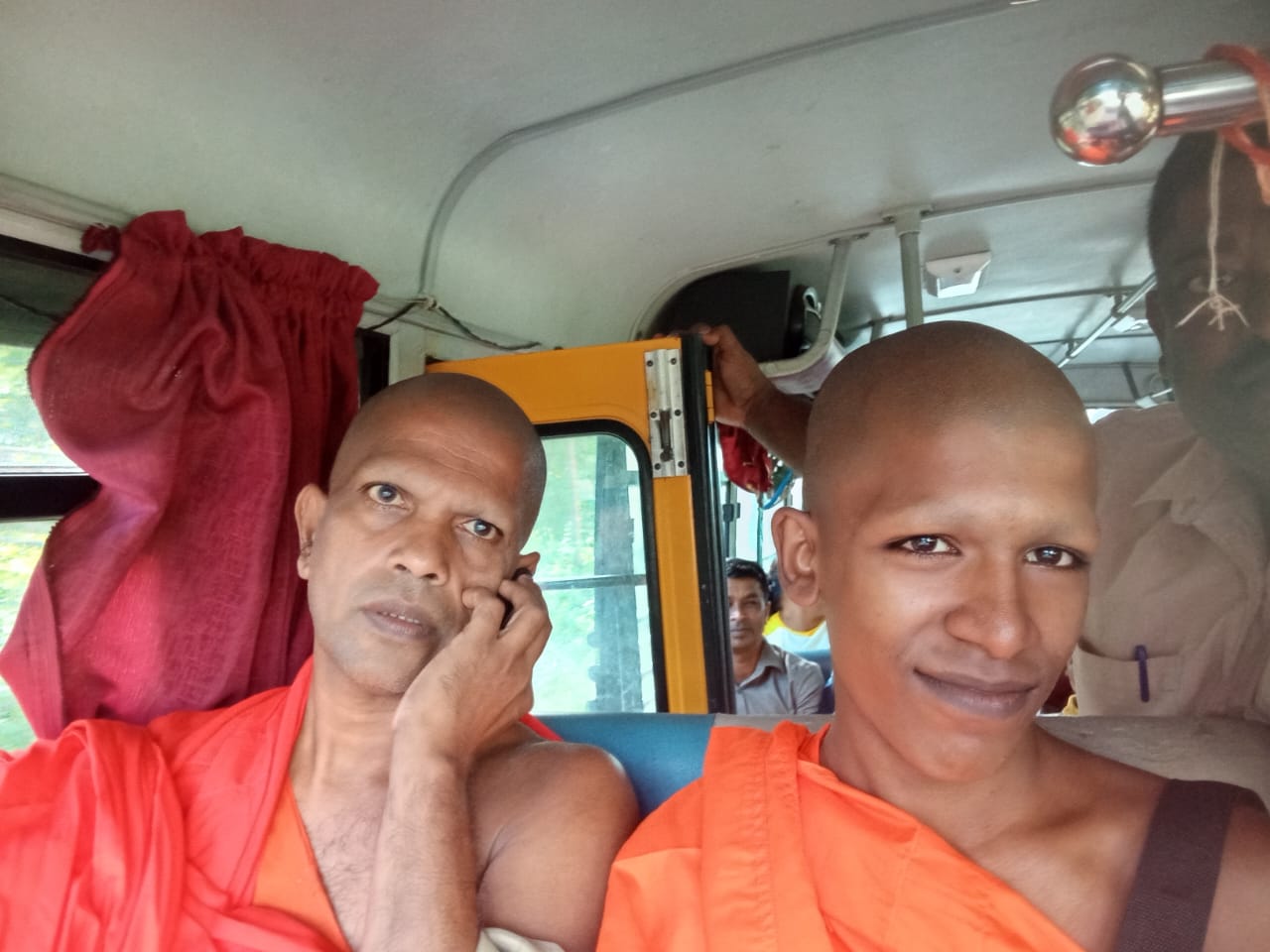

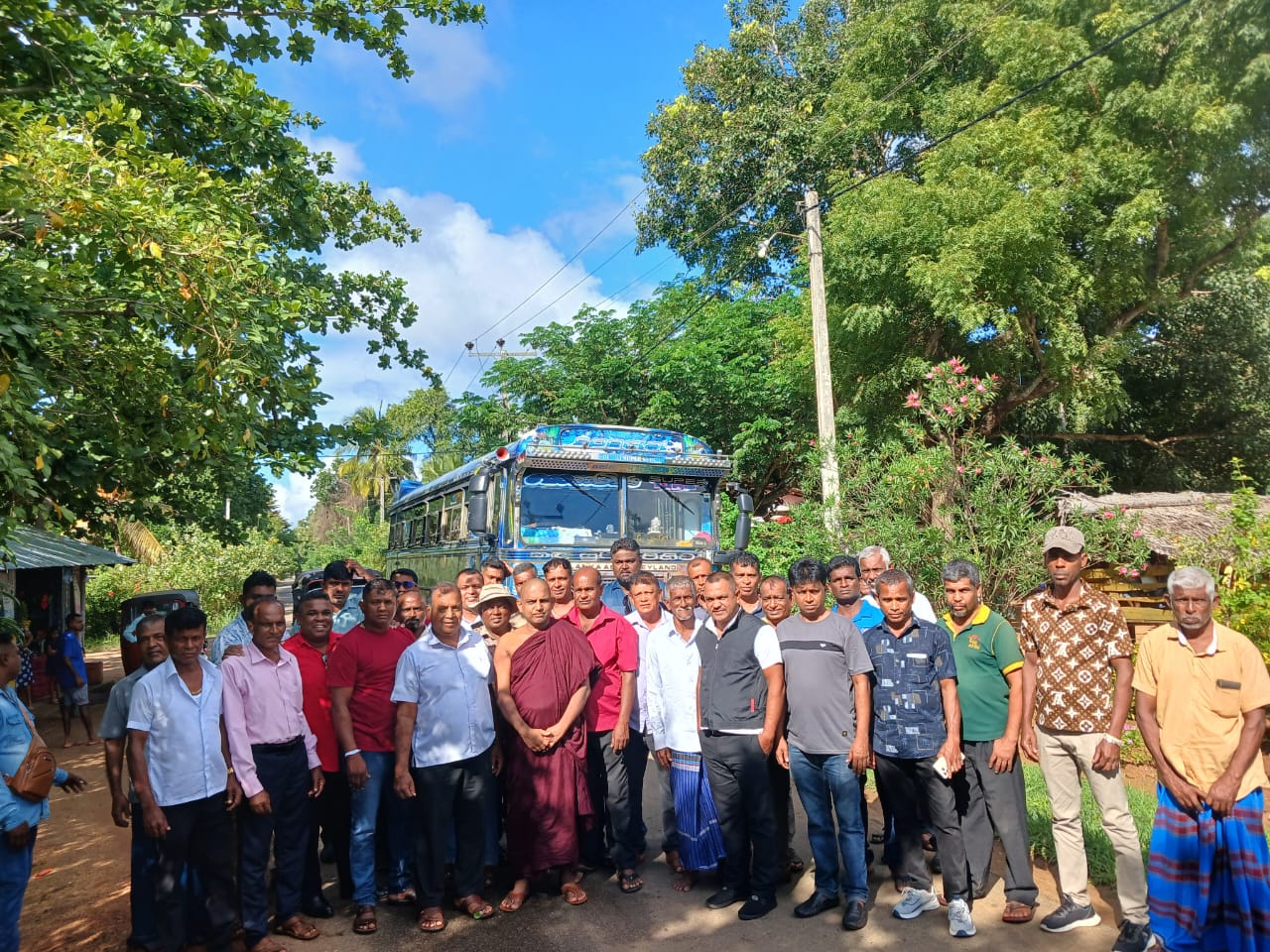
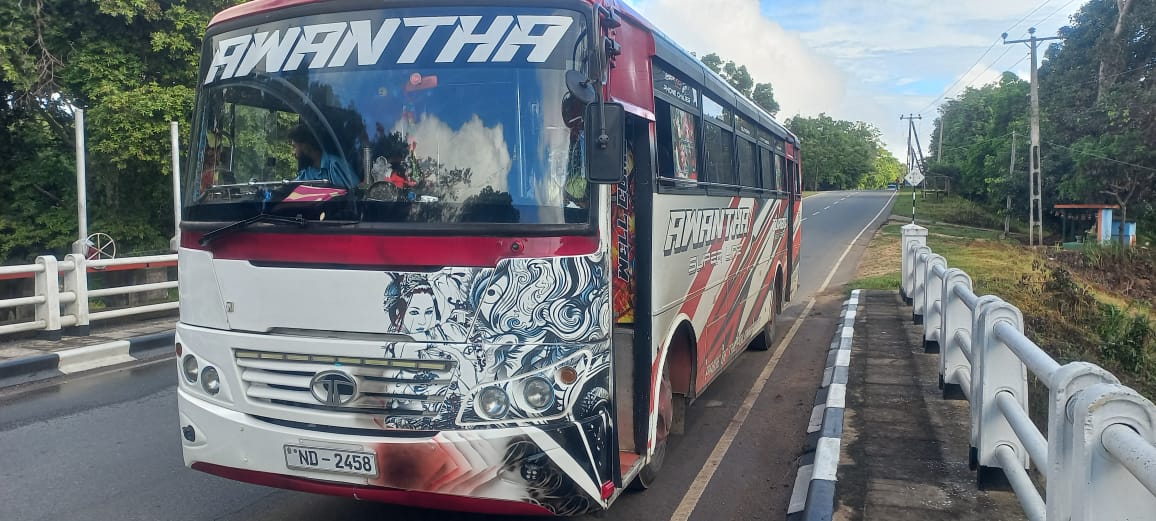
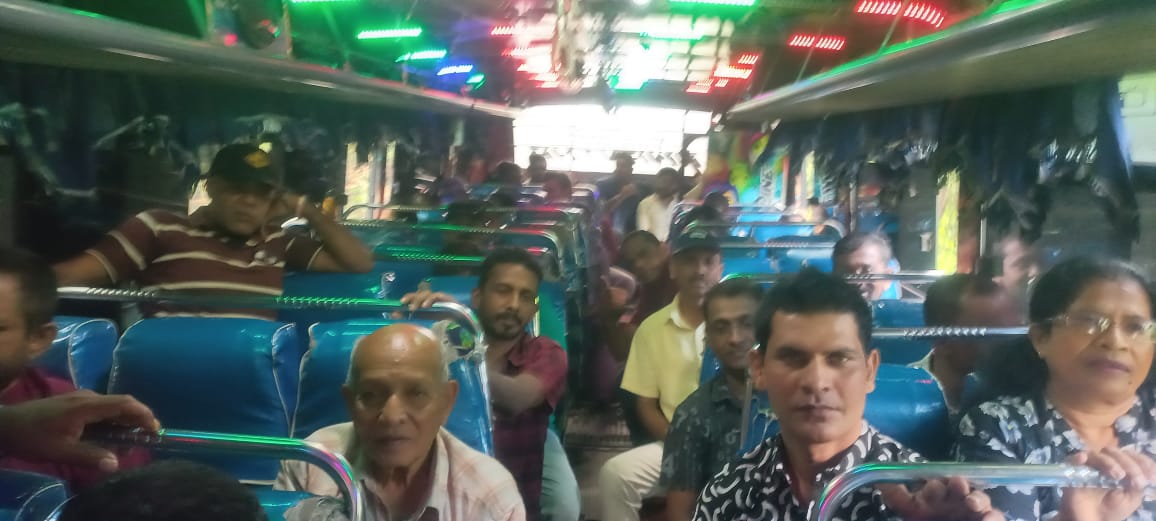
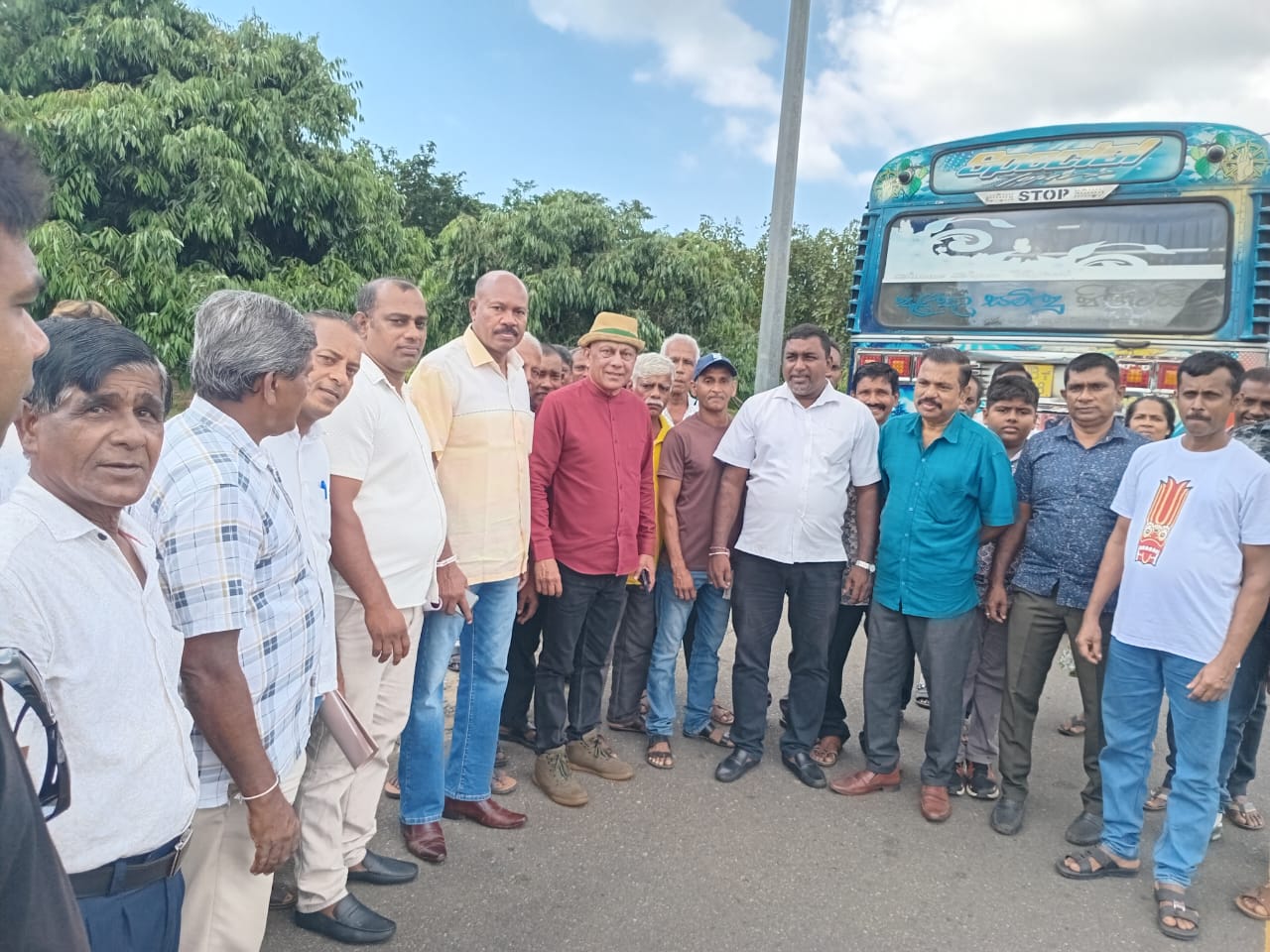

Colombo–Badulla Night Mail Services Cancelled for Second Consecutive Day
The night mail trains operating between Colombo and Badulla have been cancelled for the second consecutive day today (20) due to an obstruction on the railway line between Ohiya and Idalgashinna.
Sri Lanka Railways said the services were also cancelled last night (19) as repair and clearance work continues following a rockfall and earth slip reported along the Ohiya–Idalgashinna stretch of the upcountry line.

Sri Lanka, EU Discuss GSP+ Future amid Economic Reforms
Sri Lanka has intensified its diplomatic efforts to secure the continuation of the European Union’s GSP+ trade concession, with Deputy Minister of Foreign Affairs and Foreign Employment Arun Hemachandra meeting EU officials in Brussels this week.
The talks, held with Bernd Lange Member of the European Parliament, Chair of the International Trade Committee (INTA), and EU GSP+ Rapporteur focused on strengthening bilateral trade cooperation and safeguarding Sri Lanka’s access to one of its most valuable export privileges.
According to an official statement, the meeting centred on the future of the GSP+ scheme, which offers Sri Lankan exporters preferential access to the EU market by reducing or eliminating duties on over 6,000 product categories.
Hemachandra outlined the country’s ongoing economic stabilisation drive, including steady progress under the IMF programme, improved sovereign credit ratings, and renewed investor confidence.
He also emphasised the Government’s commitment to transparency, accountability, and inclusive governance key conditions tied to GSP+ eligibility.
The discussion further highlighted the arrival of a Fairtrade business delegation in Sri Lanka this week. The delegation’s visit is expected to create new opportunities for organic and Fairtrade-certified producers, enabling them to build long-term relationships with leading European retailers and distributors.
Officials believe this could boost Sri Lanka’s value-added exports at a time when the country is seeking stronger and more sustainable foreign exchange inflows.
Beyond the diplomatic messaging, the push to retain GSP+ carries far-reaching economic implications. For Sri Lanka, the benefits are clear: the scheme enhances export competitiveness, especially for apparel, fisheries products, rubber-based goods, and emerging organic produce.
With nearly a third of Sri Lanka’s exports destined for the EU, the preferential tariff system has helped local industries maintain their foothold against global competitors.
However, the arrangement also comes with challenges. GSP+ is conditional upon the implementation of 27 international conventions on human rights, labour rights, environmental protection, and good governance.
While successive governments have pledged compliance, periodic EU reviews often highlight areas requiring further reform. Critics argue that the pressure to meet EU benchmarks can, at times, strain domestic political consensus especially on sensitive governance and legal reforms.
At the same time, overreliance on GSP+ raises concerns about long-term export resilience. Economists caution that Sri Lanka must diversify its markets and upgrade its industrial capabilities rather than depend exclusively on tariff concessions that may not be permanent.
A potential loss of GSP+ would significantly impact export earnings and employment, particularly in the apparel sector, which employs hundreds of thousands of workers primarily rural women.
Reaffirming Sri Lanka’s position, Hemachandra told EU officials that the Government remains fully committed to meeting international standards in labour, environmental and ethical manufacturing practices. Strengthening cooperation with the EU, he said, will support the country’s industries, workers, and broader national development goals.
As Sri Lanka navigates its economic recovery, securing the continuation of the GSP+ facility remains a strategic priority. The Brussels meeting marks another step in the country’s efforts to safeguard crucial export access while working toward deeper trade and development cooperation with the European Union.
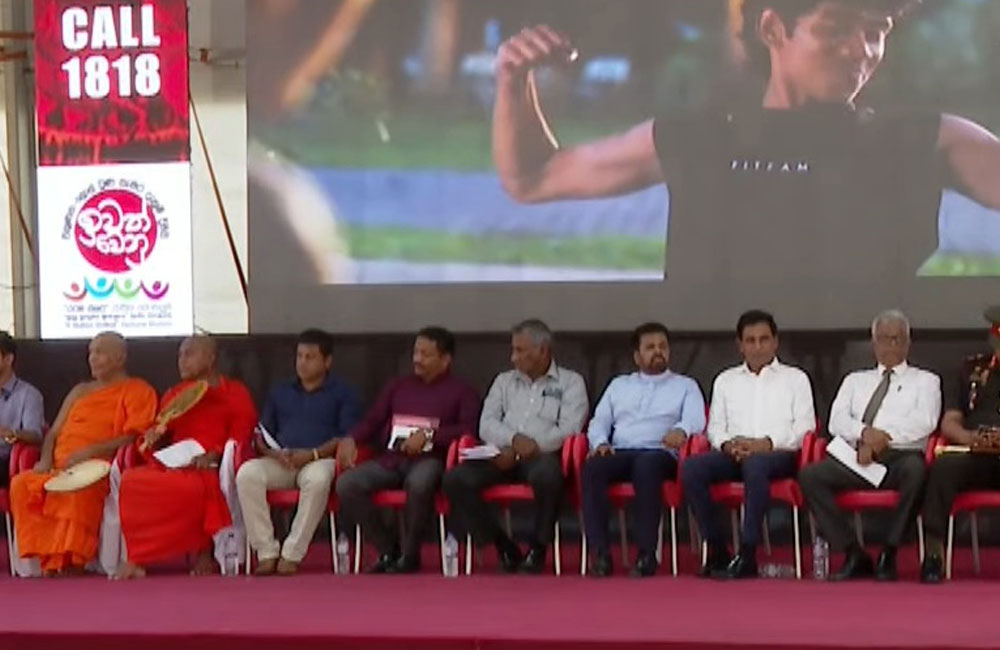
Southern Province Launches ‘A Nation United’ Anti-Drug Campaign in Tangalle
President Anura Kumara Dissanayake arrived in Tangalle this afternoon to launch the Southern Provincial Programme of the “A Nation United” National Mission, the government’s flagship initiative aimed at eliminating the drug menace in Sri Lanka.
The provincial launch is currently underway at the Tangalle Public Stadium under the President’s patronage.
Minister of Public Security Ananda Wijepala stated that this programme marks the second phase of the government’s islandwide anti-drug campaign, designed to eradicate the spread of dangerous narcotics that have grown into a national crisis.
The “A Nation United” National Mission was first inaugurated on October 30 at the Sugathadasa Stadium in Colombo, also under the patronage of President Dissanayake.

SEC, Central Bank Crack Down on Online Investment Scams
Sri Lanka’s Securities and Exchange Commission (SEC) has issued a strong public warning against individuals and social media influencers who promote investment advice without being formally registered or licensed, as regulators intensify efforts to curb the rapid rise of online financial scams.
The regulator stressed that investment recommendations shared through digital platforms—whether presented as tips, predictions, or guidance must not be made without proper regulatory approval.
“Social media content that amounts to investment recommendations must not be made without proper basis and without being a Registered Investment Advisor or a body licensed by the SEC,” the Commission said, noting that unauthorized advisors will face severe penalties.
The watchdog reiterated that violations of the SEC Act are prosecutable before the High Court, with offenders facing fines of not less than Rs. 10 million, imprisonment of up to ten years, or both. According to the regulator, these measures are essential to protect small investors who are increasingly exposed to unverified and often misleading online content.
The SEC highlighted that many inexperienced investors have been misled by self-styled online “experts” who promote unsolicited stock tips through platforms such as Facebook, YouTube, WhatsApp, and Telegram.
Authorities warn that some of these individuals engage in manipulative practices that can distort market behaviour, while others misuse the credibility of social media to draw people into high-risk or fraudulent schemes. The trend, the SEC noted, has resulted not only in significant financial losses but has also weakened public trust in regulated financial markets.
Reinforcing the SEC’s warning, the Central Bank of Sri Lanka (CBSL) has raised red flags over a new online pyramid scheme operating under the name “SGO/sgomine.com”.Following investigations, the Central Bank confirmed that the entity is conducting and promoting a prohibited scheme in violation of the Banking Act.
The regulator reminded the public that pyramid and Ponzi schemes often disguised as cryptocurrency platforms, trading apps, or digital investment opportunities are illegal, and both the operation and promotion of such schemes are criminal offences.
The Central Bank also released an updated list of entities determined to be engaged in prohibited pyramid-type activities, including Tiens Lanka Health Care, Best Life International, Mark-Wo International, Global Lifestyle Lanka, Fast3Cycle International, OnmaxDT, Sport Chain app, MTFE App and related groups, Fastwin, Fruugo Online App, Qnet/Questnet, Ride to Three Freedom, Era Miracle, Beecoin App, The Enrich Life, Windex Trading, Smart Win Entrepreneur, Net Fore International/Netrrix, Pro Care and several other affiliated entities.
Regulators have urged the public to exercise extreme caution and avoid falling prey to schemes promising extraordinary returns with little or no real economic activity.
Both the SEC and CBSL emphasised that legitimate investment opportunities are always conducted through licensed institutions, and encouraged the public to verify credentials before acting on any financial advice shared online.
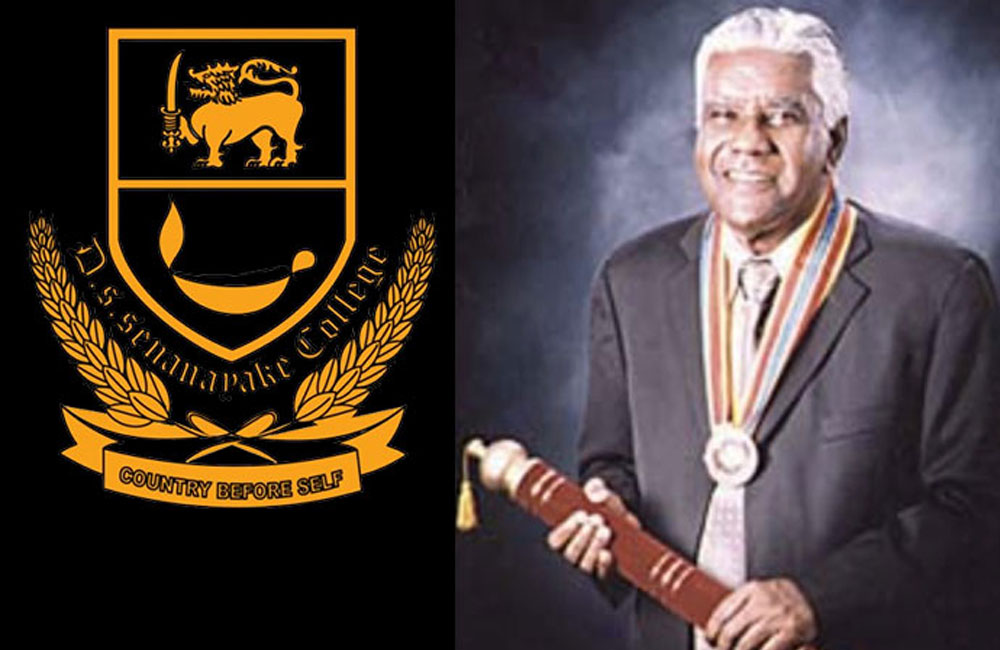
On loving memory of father of Golden Sons; R.I.T. Alles Sir
The 12th Commemoration Ceremony of the founder of our alma mater: D.S. Senanayake College is scheduled to come to light on the 27th of November 2025 at the college premises with our pound alumni Senanayakian Aravinda de Silva ayya, a former member of the National Cricket Team of Sri Lanka gracing the occasion.
Seeing the worldly light on 3rd October 1932 in Galle, Sir Ralph Ignatius Thomas Alles pursued his school education in St. Aloysius College in Galle and St. Anthony's College in Matara. Having started his career as a school teacher, he rendered his service in Royal College, Colombo for many years. Following the invitation of the education minister Hon. I.M.R.A. Iriyagolla and the principal of Royal College back then, he assumed his duties as the principal of the newly established D.S. Senanayake Junior School. Continuing his tremendous service, words cannot explain the efforts he made to enshrine D.S. Senanayake College, Colombo 7 in the education field in the country. Without stopping there, he continued serve the education system in Sri Lanka by establishing Gateway College.
That great gentleman whose name is forever remembered in the education genealogy in Sri Lanka passed away on 28th November 2013, leaving his legacy for generations to be proud of and honour.
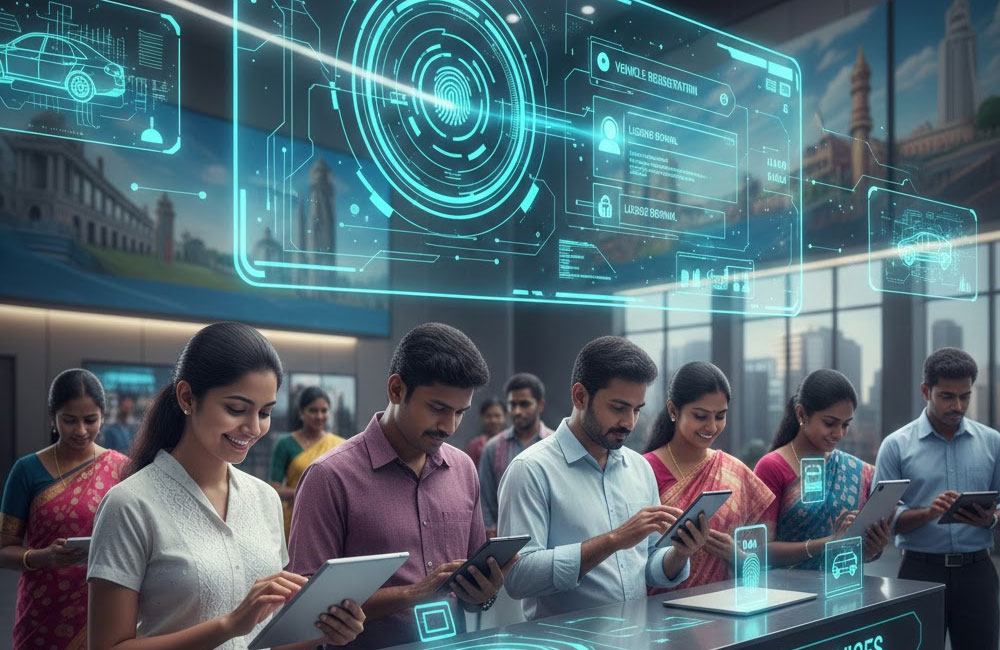
MTD Digitisation Faces Challenges amid Corruption and Tender Delays
Sri Lanka's Motor Traffic Department (MTD) is pushing forward with a major digital transformation to enhance public service efficiency, curb corruption, and improve convenience for citizens.
This move is part of the broader government initiative to modernise public services through digitalisation. However, the project faces significant hurdles, including outdated systems, slow progress, and resistance from certain corrupt officials.
The MTD has introduced online services for vehicle registration, license renewals, and fee payments, aiming to streamline processes.
Despite the promises of a more efficient system, the digitisation effort, initiated in 2018, has been hampered by procurement delays and administrative inefficiencies.
Senior officials attribute this to red tape behavior within the tender board and the slow pace of the procurement process, which has been further complicated by official changes in previous governments.
One of the core challenges lies in the inefficiency of the existing system, which has not been updated in two decades. Senior officials often retire or are transferred before projects are completed, leading to inconsistent decision-making and delays.
Furthermore, the system’s infrastructure is not capable of supporting modern technological advancements, which has led to over-reliance on external vendors, and in some cases, the abandonment of projects altogether.
In 2016, the MTD initiated a tender for a new system called e motoring, aimed at improving vehicle registration and motor vehicle transfer processes.
However, despite being awarded to a local company in 2018, the project’s implementation has been postponed repeatedly due to issues such as unsuitable office space for the system’s deployment and administrative red tape,
The original office building was deemed unfit, and the relocation of the department to a new facility has faced delays, further stalling progress, a high official of the MTD said.
Internal resistance from a few corrupted MTD officials, some of whom benefit from the outdated system, has also contributed to the project’s failure.
Allegations of corruption and fraudulent practices have emerged, with investigations by the Bribery Commission leading to the suspension of several officials.
The current system’s poor organisation and lack of proper archiving of vehicle registration documents have further facilitated malpractices.
Despite these challenges, the current MTD Commissioner General Nishantha Anuruddha Weerasingha has made strides in implementing some reforms.
Recently, the department began scanning and archiving vehicle registration documents to improve record-keeping.
Although the full e motoring system is still pending approval, these initial steps are intended to clean up existing processes. Additionally, the Commissioner plans to continue the system's rollout in the current Narahenpita building, rather than relocating as previously suggested.
Despite these hurdles, the department has seen some success. The Commissioner has managed to increase the department’s revenue even in the face of restrictions on vehicle imports.
He has also worked to reduce the backlog of over 950,000 pending driving license applications, clearing 95 percent of it.
Looking ahead, the MTD is planning to launch an e Driving License system, which will be accessible via mobile phones, and introduce a new system to track traffic violations through demerit points, which will allow for real-time fine payments by offenders.
While the road to full digitisation remains fraught with challenges, the MTD is taking significant steps to modernise its operations and improve service delivery.
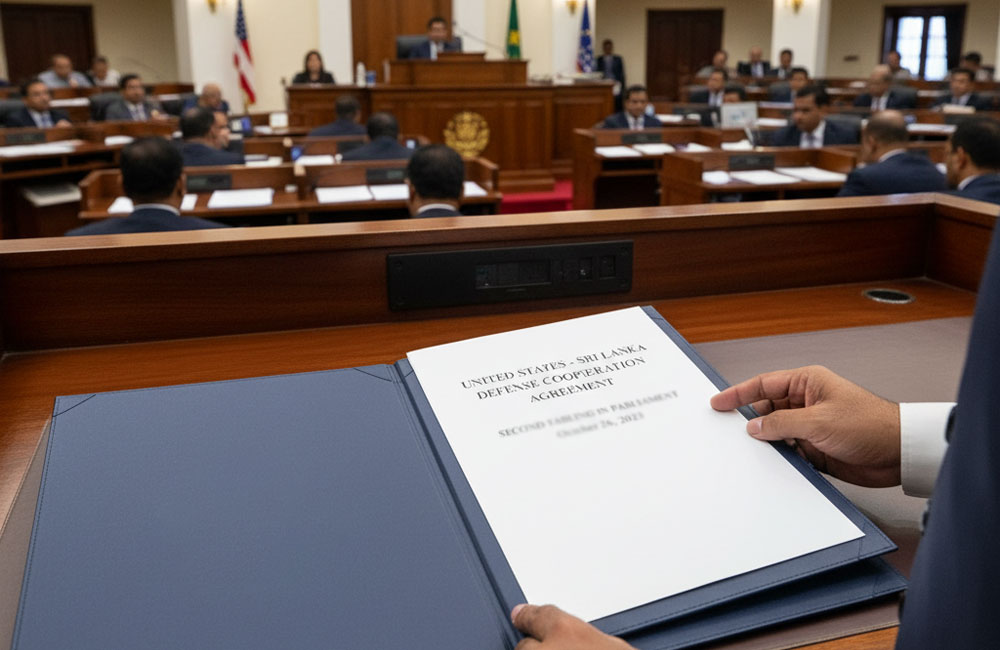
US–Sri Lanka defense agreement tabled in Parliament for the second time
The defence agreement signed between Sri Lanka and the United States will be tabled in Parliament for the second time today (20), the Deputy Minister of Defence, Major General Aruna Jayasekara (Retd) stated.
The Deputy Minister made this statement while expressing his views in Parliament.
Earlier today, Parliamentarian Dayasiri Jayasekara stated that although it was previously claimed that the agreement had been tabled, only a Sinhala-language version of the document had been presented to Parliament.
MP Jayasekara claimed that the agreement had not been officially tabled in Parliament.
Responding to this, the Deputy Minister of Defence said that the agreement had in fact been tabled earlier during the third reading debate of the Defence Ministry and that he is tabling it once again today.
In a bid to enhance bilateral defence cooperation, the United States and Sri Lanka signed a Memorandum of Understanding (MOU) on November 14 at the Ministry of Defence.
US Ambassador Julie Chung and Brigadier General Trenton Gibson, Adjutant General of the Montana National Guard signed the agreement on behalf of the U.S. Government, while the Secretary of Defence Air Vice Marshal Sampath Thuyacontha (Retd) signed on behalf of the Government of Sri Lanka.
The agreement formalises collaboration between the Montana National Guard, U.S. Coast Guard District 13, and the Sri Lanka Armed Forces under the U.S. Department of Defence’s State Partnership Program (SPP), the Defence Ministry said in a statement.
Speaking after signing the agreement, the Deputy Minister, Major General Jayasekara (Retd), underscored the significance of the MOU, stating that it represents a pivotal milestone in the enduring defence partnership between Sri Lanka and the United States.
He said, “this landmark agreement underscores our shared strategic interests and mutual commitment, paving the way for enhanced collaboration in capacity building, joint training, humanitarian assistance, disaster response, cyber defence, peacekeeping, CBRN response, and leadership development. We deeply appreciate the unwavering friendship, solidarity, and generosity of the United States and look forward to further strengthening this vital partnership.”
Meanwhile, U.S. Ambassador Julie Chung also underscored the importance of the US–Sri Lanka defence cooperation in her remarks and emphasized the deep and enduring friendship between the two nations, highlighting the significance of continued defence cooperation and mutual understanding. She acknowledged the longstanding partnership built on shared values, expressing confidence that the renewed commitments would allow shared training and learning opportunities.
With this MOU, Sri Lanka has formally joined the global network of 115 nations partnered with U.S. state National Guards under the State Partnership Program (SPP). The first series of joint activities under the MOU is planned to be held in 2026 and will focus on disaster response, maritime domain awareness, and professional military education. The partnership will enhance interoperability through joint training, maritime cooperation to counter trafficking and illicit migration, crisis response and humanitarian assistance, aviation operations, and strengthened military - civilian disaster preparedness, the Defence Ministry noted.
( Source : adaderana.lk)
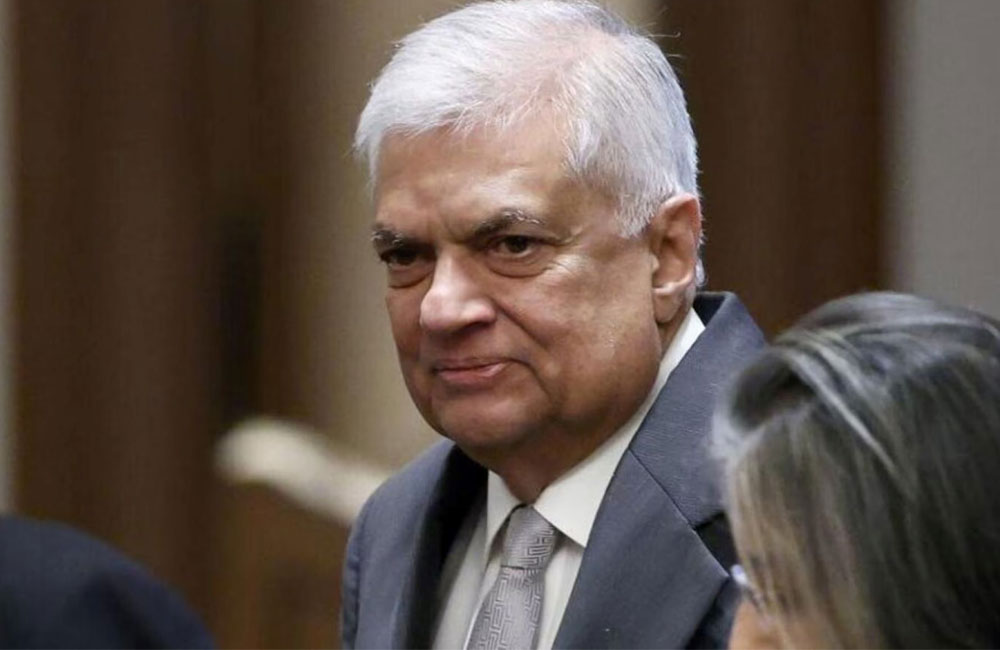
Ranil Wickremesinghe Departs for Chennai on Morning Flight
Former President and UNP Leader Ranil Wickremesinghe departed from the Bandaranaike International Airport (BIA) to Chennai, India, this morning (21), airport officials confirmed.
He was accompanied by his wife, Maithri Wickremesinghe, and the couple arrived at the airport in the early hours. They boarded SriLankan Airlines flight UL-121, which departed at 8:40 a.m. for Chennai.

National Audit Exposes Massive Waste Undermining Sri Lanka’s Livestock Sector
Sri Lanka’s already-fragile animal husbandry sector has been dealt another blow, with the Auditor General’s latest report uncovering a series of costly missteps, failed investments and systemic weaknesses inside the Department of Animal Production and Health (DAPH).
The audit, covering the year ending December 31, 2024, reveals that more than Rs. 200 million in public funds has been locked up in collapsed breeding projects, oversized equipment purchases and chronic underutilisation of budget allocations raising serious questions about the country’s livestock development strategy.
At the heart of the audit is the disastrous Boer goat breeding project, launched in 2019 to introduce high-quality breeder goats from Australia. The government invested Rs. 37.3 million to import 100 animals, with a five-year plan to distribute 250 improved goats to farming communities. Instead, the project imploded. An outbreak of Caprine Arthritis Encephalitis (CAE)an incurable viral disease infected the herd during quarantine, crippling breeding operations.
Despite spending an additional Rs. 75.3 million on maintenance and disease management, the DAPH failed to salvage the initiative. By the end of 2024, distribution had been suspended entirely, and 141 diseased goats remained at the Imbulandanda breeding centre.
A special committee recommended culling the infected herd in January 2024, but the department failed to act for more than a year continuing to spend public money on a hopelessly compromised stock. The project’s total loss now stands at Rs. 112.6 million, the audit confirms.
Agriculture economists warn that such failures have far-reaching consequences for farmers who depend on improved breeding stock to increase meat and milk yields. With local goat milk production growing only marginally over the past decade and demand rising sharply, the collapse of a flagship breeding initiative further widens the gap between national livestock potential and output. Industry analysts also note that Sri Lanka imports over 60% of its annual requirement of goat meat, underscoring the economic cost of failed domestic breeding programmes.
The audit also exposed troubling procurement decisions in the veterinary health sector. A Rs. 96.5 million high-capacity bioreactor purchased in 2022 for vaccine production sits under-utilised due to a dramatic mismatch between output capacity and national demand.
Although the machine can produce up to 1.2 million doses, the country requires only about 300,000 doses under the relevant disease-control programme. The DAPH disputes the output figures, asserting a maximum capacity of 500,000 doses, but auditors argue that the purchase still reflects poor planning and weak demand assessment.
This misalignment comes on top of earlier inefficiencies. Between 2018 and 2020, Sri Lanka spent Rs. 89.3 million on vaccine imports costs that could have been avoided with more efficient disease-control strategies adopted sooner, the report states.
Further compounding the issue is chronic underutilisation of financial allocations, with Rs. 242.6 millionor 15% of the department’s total provision left unused in 2024. Experts say such budget lapses indicate institutional paralysis at a time when the livestock sector urgently needs investment in genetics, disease control, pasture development and farmer training.
The Auditor General’s findings paint a stark picture: a sector burdened by poor planning, delayed decision-making, avoidable waste and structural weaknesses. At a time when livestock is critical for rural incomes, nutrition and import substitution, and these failures threaten to further undermine Sri Lanka’s food-security goals


Met Dept Warns of Heavy Rainfall in Several Provinces
The Department of Meteorology forecasts showers or thundershowers at times in the Northern, North-Central, and Eastern provinces today (21).
Several other areas across the island are also expected to experience showers or thundershowers after 1.00 p.m.
Fairly heavy rainfall of over 50 mm is likely in parts of the Western and Sabaragamuwa provinces, as well as in the Galle, Matara, and Nuwara Eliya districts.
Misty conditions may occur during the early morning hours in the Sabaragamuwa, Central, Uva, Western, and Southern provinces.
The public is advised to take necessary precautions to minimize damages caused by temporary strong winds and lightning during thundershowers.
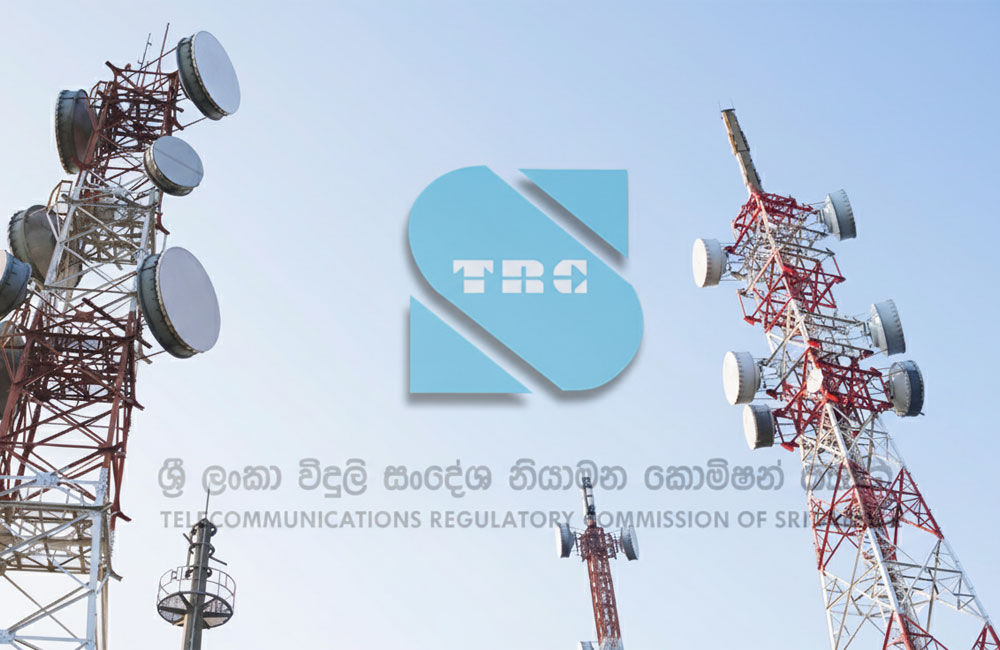
Telecom Levy Collapse Raises Fears of Widening Digital Divide
Sri Lanka’s national effort to improve connectivity in rural and underserved regions is facing a serious setback as revenue from the Telecommunications Development Charge (TDC) continues to shrink sharply, raising concerns about long-term digital infrastructure expansion and economic inclusion.
The decline was disclosed by Telecommunications Regulatory Commission of Sri Lanka (TRCSL) Director, Air vice Marshal Bandula Herath, during a briefing to the Committee on Public Finance (COPF).
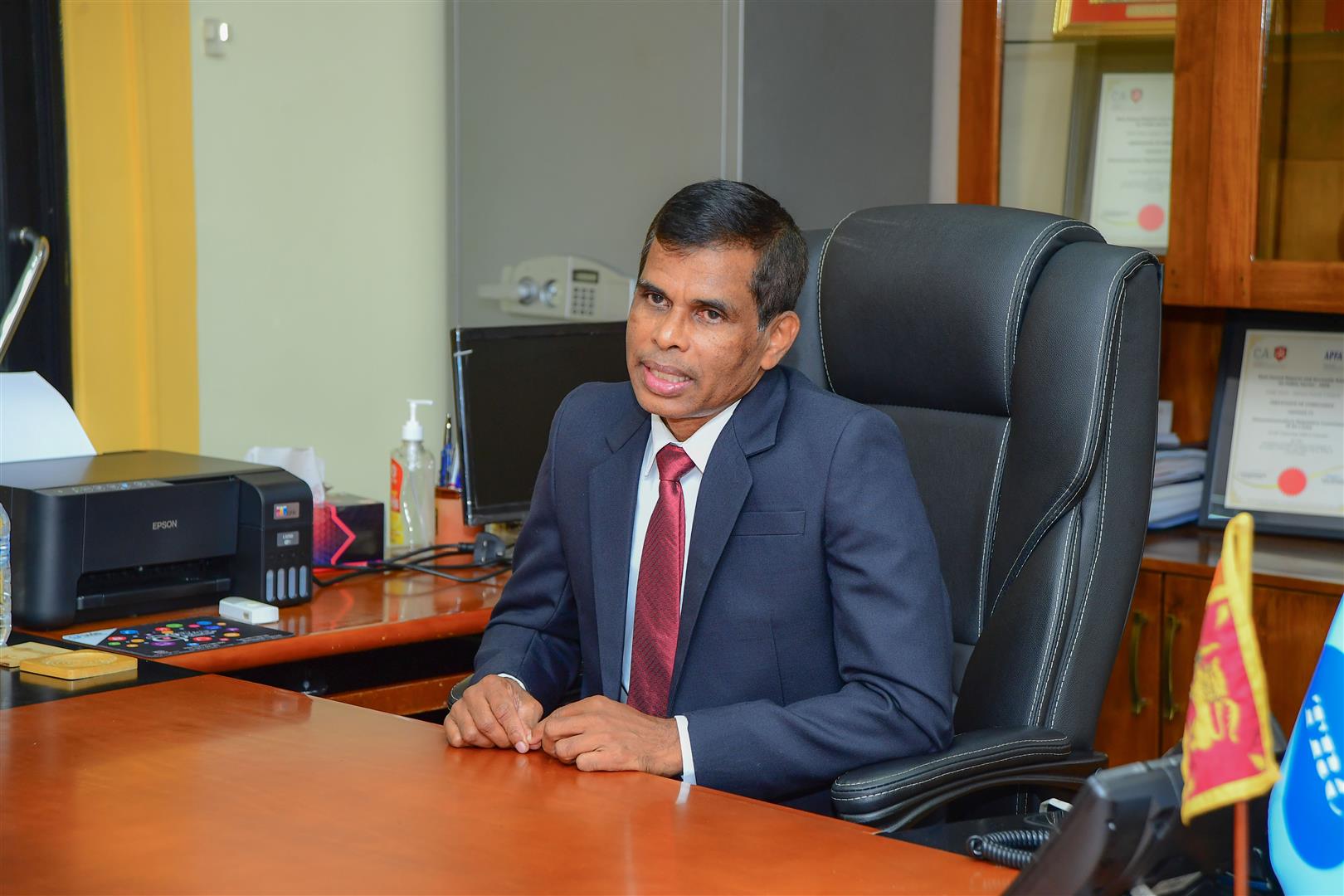 (TRCSL) Director, Air vice Marshal Bandula Herath
(TRCSL) Director, Air vice Marshal Bandula Herath
Herath noted that the TDC traditionally funded through levies on international call charges is now generating significantly less revenue as Sri Lankans increasingly rely on internet-based platforms for communication.
“Revenues from international calls have dropped because data is now the primary mode of communication,” he said, explaining that the fall in collections threatens the sustainability of the Universal Service Fund (USF), which finances connectivity in areas that private operators deem unprofitable.
The TDC was designed as a corrective mechanism to ensure that telecommunications development reached villages, remote regions and economically marginalised communities. Operators typically avoid these regions because of low returns.
To bridge this gap, the TRCSL provides co-funding for towers and network expansion projects, historically covering 50% of tower construction costs. This subsidy was increased to 75% in 2024, reflecting both the urgency of rural digital expansion and the diminishing private-sector appetite to invest.
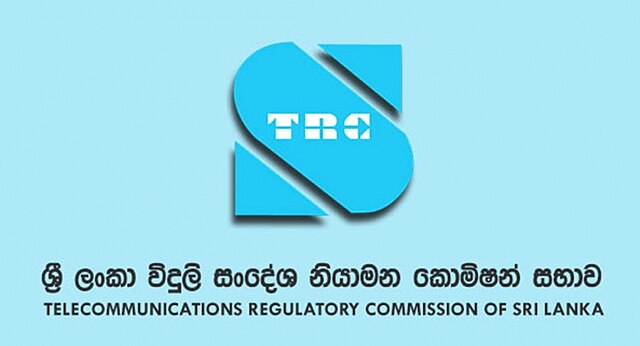 TRCSL
TRCSL
However, as the levy pool shrinks, concerns are emerging over whether the TRCSL can sustain this higher level of support. Over the past two years, the fund has financed 79 towers with an allocation of Rs. 1.3 billion, but officials warn that future investments may be constrained unless alternative revenue sources are identified.
Digital-economy analysts argue that the decline in TDC revenue exposes deeper structural vulnerabilities within Sri Lanka’s telecom ecosystem. With digital-service adoption accelerating nationwide, they argue that policy frameworks must evolve to reflect changing communication behaviours.
Continuing to rely on international call traffic now a diminishing revenue base risks widening the digital divide at a time when rural households, students and small businesses are increasingly dependent on connectivity for education, health access, market information and online services.
The economic implications are far-reaching: weaker digital infrastructure slows rural entrepreneurship, depresses productivity, reduces access to e-government services and hampers the country’s broader digital-transformation agenda. The issue is particularly urgent as Sri Lanka is pushing for digital-economy growth, e-commerce expansion and technology-enabled public services.
In response to the crisis, President Anura Kumara Dissanayake, in his role as Minister of the Digital Economy, has proposed allocating Rs. 17.5 billion over the next five years to expand telecommunications coverage in underserved areas using the USF. While the proposal signals policy commitment, experts question whether heavy reliance on the TDC without modernising its revenue model can sustain such an ambitious programme.
As Sri Lanka’s reliance on data-driven communication continues to surge, the country faces a pivotal decision: either reform the funding model for digital-infrastructure expansion or risk leaving its rural population disconnected from the opportunities of a modern digital economy.
Page 46 of 653